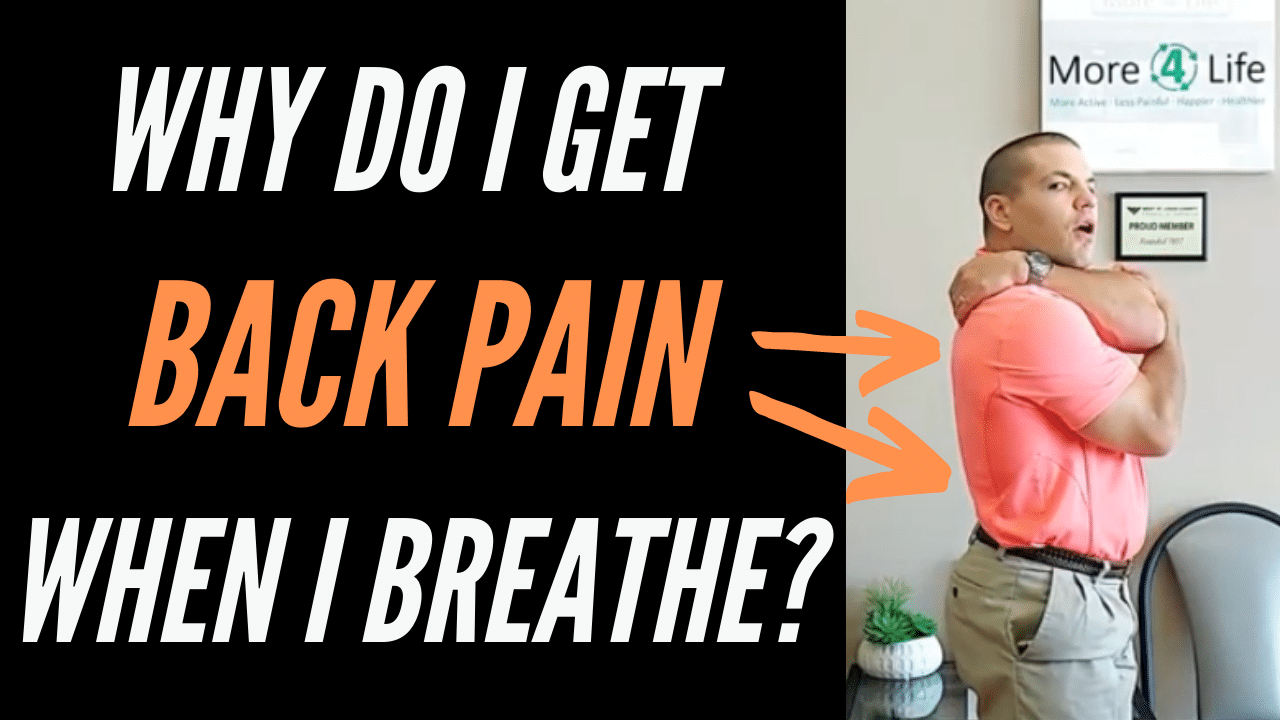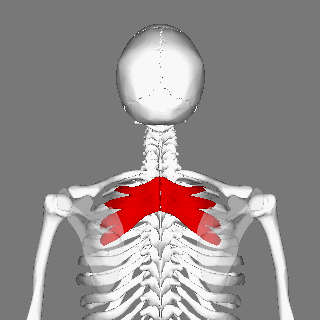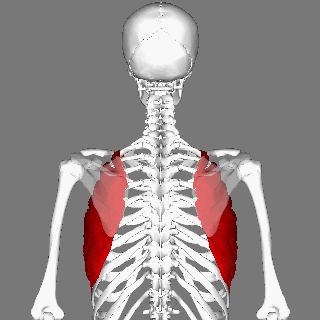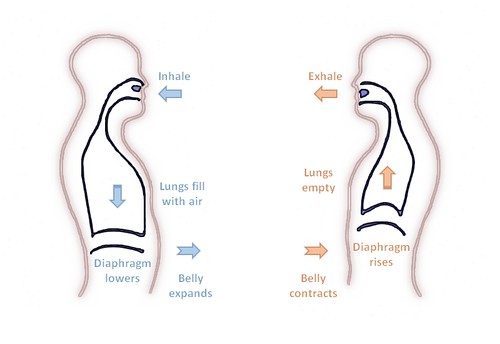Want to learn what can cause back pain when you breathe and what you can do to relieve it?
About once a month, a patient will as me "Why do I get back pain when I breathe?"
Watch the video to learn what things can cause back pain when you breathe, when it's serious, when it's not, and what you can do to relieve the pain.
What Causes Upper or Middle Back Pain When Breathing?
If you have upper or middle back pain when you breathe, you first want to rule out any potentially serious causes.
Potentially serious causes of upper / middle back pain when breathing include:
-
Heart attack (most urgent)
-
Pneumonia, pleurisy, or other respiratory infection
Symptoms of a heart attack include pain in the chest, shoulder, upper back, are, neck, or jaw. Most often these symptoms are on the left side, but some women have atypical symptoms. If your pain came on suddenly without reason, feels like you are having difficulty breathing (not just pain), or gets worse with physical exertion like walking, STOP reading this post and get to a doctor's office or ER to get it check out.
Other more serious symptoms include respiratory conditions. If you've recently had a cough, sore throat, or feel like there's fluid in your lungs, this might also be something to get checked out, especially if you're feeling short of breathe.
If you've ruled out these causes, there are less serious causes of back pain when breathing.
Less serious causes of upper / middle back pain when breathing include:
-
Rib dysfunction
-
Thoracic Disc Injury / Nerve Problem
-
Muscle Strain
-
Anxiety attack
How To Ease Back Pain When Breathing From A Rib Dysfunction
Your ribs join with the spine in the back and to your sternum in the front. Thus, just like any other joint in your body, you can get an injury, misalignment, or movement restriction to that joint.
If you put your hands on the front of your chest near your sternum at the same level as where your back pain is, you might notice that one rib is either pushed more forward than the rest or that one rib is pushed further back than the rest.
To help relieve the back pain that you get when breathing, you need to get the joints aligned correctly and moving properly.
Follow these tips if you find one rib that is pushed farther forward than the other ribs
-
Find the rib that's sticking forward.
-
Make a fist with the same side hand and put it over the rib
-
Put your opposite palm over your fist
-
Breathe in and out 3-5 time while applying pressure to the rib with your fist.
Follow these tips if you find one rib that is pushed farther back than the other ribs
- Lean up against a doorway or corner of a wall such that the doorway hits over the area where your back hurts
- Breathe in and out 3-5 times leaning back into the doorway so as to put pressure on the back of the rib
If this doesn't stop your back pain when breathing you might want to seek out help.
Simple treatments such as manipulation of the upper back and ribs joints can help to get the rib moving properly again and relieve your upper or middle back pain when breathing.
Need Some Help For Upper Or Middle Back Pain?
Click the button below to request a FREE Consultation...
A Thoracic Disc Herniation or Pinched Nerve Can Cause Upper Back Pain When You Breath
A herniated thoracic disc or a pinched nerve in the thoracic spine can cause upper back pain between the shoulder blades when you breath, and also potentially chest pain at the same level.
Learn more about what to do to stop upper back pain from a pinched nerve by reading this post.
Muscle Strains Can Also Be A Cause Of Upper or Middle Back Pain When You Breathe
There are a lot of muscles that attach to the rib cage that can cause pain in the middle of the back when breathing such as the:
Serrratus Posterior Superior

Serratus Anterior

Rhomobids

Intercostal Muscles

Serratus Posterior Inferior

As you can see, there are a lot of muscles that attach to your ribcage, and dysfunction in any of these muscle groups can cause back pain when breathing.
These muscles tend to go into dysfunction if you're breathing shallowly using the muscles in your neck and upper back to breathe instead of your diaphragm. This is common if you tend to get anxious, and even moreso if you're having an anxiety attack.
Fortunately, there are some simple tips you can use to get these muscles back in balance.
Diaphragmatic Breathing Can Relieve Back Pain When You Breathe
The diaphragm is your main breathing muscle. It's a dome-shaped muscle located under your ribcage.
As you breathe in (inhale), your belly should move out, and as you breath out (exhale), your belly should move in.
Here's how to breath properly using your diaphgragm.
-
Put one hand on our belly
-
Put your other hand on your chest
-
Push your belly out, allowing air to flow into your lungs
-
Breath out and allow your belly to fall. Don't force the exhalation, just allow your belly to relax
-
You don't have to think about breathing or making breathe sounds. Just focus on the rise and fall of your belly and air will naturally move in and out of your lungs.
Need Some More Help For Back Pain?
Click the button below to discover how we can help you...
Why Do I Get Lower Back Pain When I Breathe?
Slower back pain when breathing is also commonly caused by muscle spasms.
As mentioned above, the serratus posterior inferior muscle is one of the muscles that can cause lower back pain when breathing.
Additionally your abdominal muscles muscles attach into the and lower back muscles (i.e. quadratus lumborum, errector spinae) have attachments into your ribcage and can also cause lower back pain when breathing. The diagram below shows a cross section of your abodmen and lower back. The abdominal muscles are the light brown/pinkish muscles at the top and around the outside of the trunk. Your Lower back muscles are at the bottom of the picture.
As you do the diaphragmatic breathing mentioned above, and as shown in the video, your abdominal cavity expands and manually stretches some of these thigh, sore muscle spasms.
In addition, diaphragmatic breathing release chemicals from your brain that are natural pain relievers. They're very similar in structure to opioids, but they're 50-60 times stronger, and since your body produces them naturally, they don't have side effects.
Sometimes though, if your muscles have been stiff for a long time, it takes a little additional help to get them jump started.
Treatments like myofascial release, trigger point therapy, and dry needling can be helpful to get your muscles to relax fast. These are all treatments that we provide here at More 4 Life.
Need Help For Back Pain When You Breathe?
Click the button below to ask about cost & availability of appointments.








